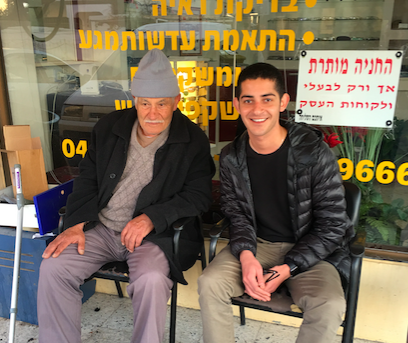The Arab village of Tarshiha was the primary military outpost for Fawzi al-Qawuqji and the Arab Liberation Army during the Arab-Israeli war in 1948. After sustaining hours of plane bombings and heavy artillery fire, the town was overrun by the Israel Defense Forces during Operation Hiram. Tarshiha's fighters and villagers were forced to retreat, with most heading north into Lebanon. ___________________________________________________________________________________________ My grandfather left Tarshiha on foot and headed for Lebanon, with hope that he would return once the war was over. Little did he know that he would become a refugee, and the first of four generations of Palestinian refugees who would live in refugee camps, deprived of human rights while caught in a limbo between the right to exist and the right of return. More than a third of all Palestinian refugees now are forced to live in poorly-maintained refugee camps in Lebanon. In 2002, my grandfather passed away. On his deathbed, Tarshiha was all he talked about. He had lived his entire life dreaming of the day he would return, and when fate betrayed him, dreaming became all that he had. He even asked to be buried there--a final wish that was impossible to grant. No Palestinian refugees are permitted to travel into Israel or any of the Palestinian territories. Tarshiha is only 100 kilometers away from the Lebanese capital of Beirut, but with a closed border standing between Lebanon and Israel, Tarshiha is practically unreachable. 67 years after his exodus, I embarked on a journey to find Tarshiha, the place my grandfather called home. As a Canadian citizen now, I have become the first member of my family able to legally enter Israel. As I drove north from Jerusalem, my mind was filled with memories of my grandfather. I thought of all the stories he had told of Tarshiha--about the mosque, the church, and the roads with the olive trees. I listened to the music my grandfather loved, and lost myself in the reverie. I was scared and excited at the same time. I was finally seeing the land that my grandfather had painted in my imagination for so many years. When I first came upon a sign that read Tarshiha, I stopped, took a photo with it . . . and cried.
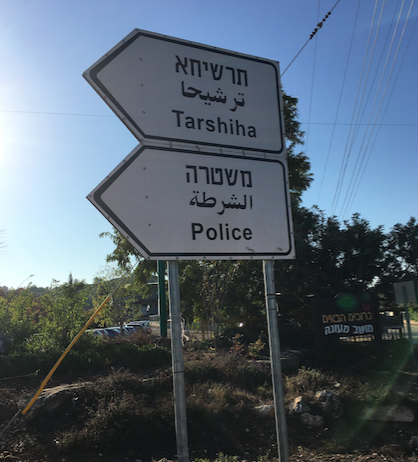
I wasn't sure what to do next. Surrounded by strangers, I didn't know where to begin my journey through my family's origins. Suddenly I was living my grandfather's dream, seeing Tarshiha with my own eyes. The old streets are exactly as he had described them. The mosque is there, the church still stood. I had the biggest smile on my face, mixed with fears and tears.
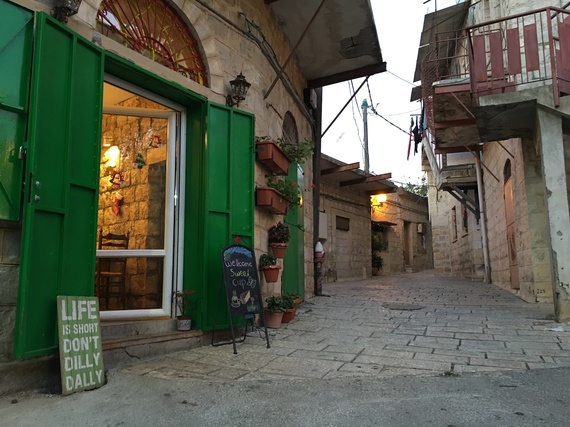 I stopped a young man walking down the street. "Is this Tarshiha?" I asked. He answered in Arabic, "Yes, this is Tarshiha." I knew that it was, but I sought spoken affirmation nonetheless. Finally, I could hear someone telling me I was in my home village. The young man stared at me and saw a lost boy with watery eyes. But he could not fully see the storm of emotions hitting me at the moment. I explained to him, "My grandfather lived here over 60 years ago. His name is Ragheb Kiblawi; his father's name is Saleh Kiblawi." "Sorry, I don't know who that is," he told me. He stopped a car passing by, and the driver said the same. I was less than surprised, as they both appeared much too young to have known my grandfather. My emotions waned, and I left just a little disappointed. I found a falafel shop while searching for a place to eat and collect myself. Some of the town's residents were gathered inside. When the shop owner heard my story, he became excited. Finally, I wasn't the only one! The shop owner asked someone to take me to an old man well-versed in the history of Tarshiha. I was led inside a tiny hut, where he sat surrounded by maps. He was a real estate agent, and he welcomed me warmly.
I stopped a young man walking down the street. "Is this Tarshiha?" I asked. He answered in Arabic, "Yes, this is Tarshiha." I knew that it was, but I sought spoken affirmation nonetheless. Finally, I could hear someone telling me I was in my home village. The young man stared at me and saw a lost boy with watery eyes. But he could not fully see the storm of emotions hitting me at the moment. I explained to him, "My grandfather lived here over 60 years ago. His name is Ragheb Kiblawi; his father's name is Saleh Kiblawi." "Sorry, I don't know who that is," he told me. He stopped a car passing by, and the driver said the same. I was less than surprised, as they both appeared much too young to have known my grandfather. My emotions waned, and I left just a little disappointed. I found a falafel shop while searching for a place to eat and collect myself. Some of the town's residents were gathered inside. When the shop owner heard my story, he became excited. Finally, I wasn't the only one! The shop owner asked someone to take me to an old man well-versed in the history of Tarshiha. I was led inside a tiny hut, where he sat surrounded by maps. He was a real estate agent, and he welcomed me warmly.
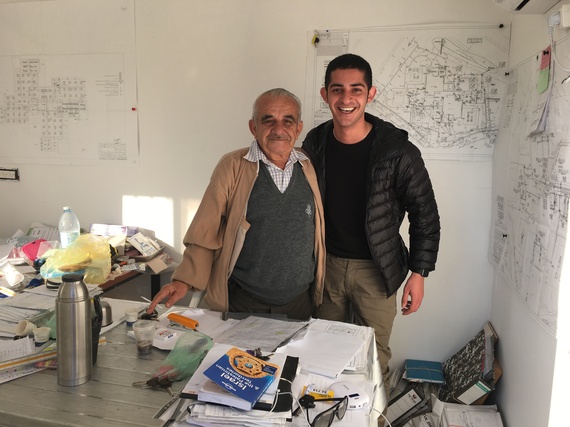
I told him who I was, and he immediately recalled my great grandfather. "Saleh owned a cafe, I remember." I let out a sigh of relief at the further affirmation of my grandfather's stories. They weren't just stories, but a reality that had been harsh on him, affecting each of the generations that followed. The old man asked someone to take me to where my grandfather once lived. When we arrived, I requested my companion to give me some time alone, to which he complied.
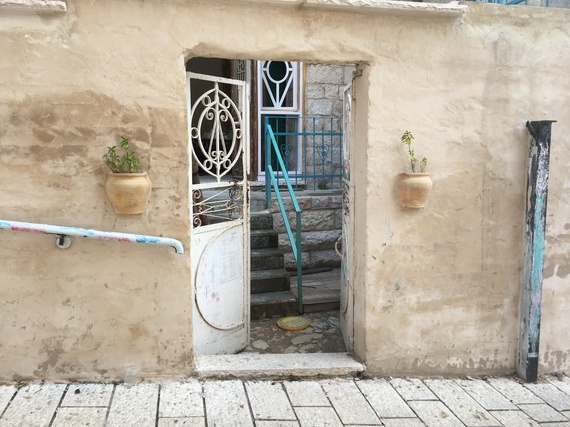
There, life's countless possibilities flashed through every space of my consciousness. I was reliving the stories, imagining the life for our family had there been no war, and no displacement. I took a video of the neighborhood so that I could share it with my family still living as Palestinian refugees in Lebanon. For them, it is even more emotional. It is the place they are forbidden to visit, but now they could see it through my eyes. I walked the streets of Tarshiha for a long time. I listened to stories from any resident who would tell me one. I found an old man who knew my grandfather, and he told me tales that reminded me of him.
My grandfather's stories were real, the village is real, and experiencing them for myself will help keep those memories alive. It felt strange to finally reach the place I was forced out of for most of my life--an experience my family has been denied. Those around my age living in Tarshiha didn't want me to leave. They invited me for drinks, then we all stayed over at the falafel shop owner's house. They longed to hear about the people who left years ago, and they were living their own tales through me. The next morning, I planted an olive tree for my grandfather in his village. While I could not fulfill his dream of burying him in Tarshiha, I did the best that I could. I chose to plant the tree as a symbol of hope and peace for my family and for the remaining inhabitants of Tarshiha, that they may be spared further conflict and war.
My grandfather was forced out of his village in 1948; this is when he became a Palestinian refugee in Lebanon, never allowed to return back. On his deathbed, his village in Palestine is all he talked about. 67 years after, I am planting an olive tree for him there. Now you can Rest in Peace grandpa... طُرد جدي من قريته (ترشيحا، فلسطين) في ١٩٤٨. بعد ٦٧ عاماً، عدت لأزرع شجرة زيتون في مسقط رأسه الذي حلم بالعودة له و كان كل ما حكى عنه على فراش الموت.
Posted by Chaker Khazaal on Saturday, January 2, 2016
While fulfilling my dream and my grandfather's, I could not help but think of the more than 50 million refugees living in our world today. When will they return to their villages, if ever? How will they feel? What about those whose villages have been destroyed by war? Where will their memories and stories find refuge?
Kissing the road that 67 years ago my grandfather took out of his village and became a Palestinian refugee... أبوس الأرض التي سلكها جدي من ٦٧ عاماً وأصبح لاجئاً فلسطينياً. هذه أرض فلسطين...
Posted by Chaker Khazaal on Sunday, January 10, 2016
Our 2024 Coverage Needs You
It's Another Trump-Biden Showdown — And We Need Your Help
The Future Of Democracy Is At Stake
The Wartime Updates You Need To Know
Your Loyalty Means The World To Us
As Americans head to the polls in 2024, the very future of our country is at stake. At HuffPost, we believe that a free press is critical to creating well-informed voters. That's why our journalism is free for everyone, even though other newsrooms retreat behind expensive paywalls.
Our journalists will continue to cover the twists and turns during this historic presidential election. With your help, we'll bring you hard-hitting investigations, well-researched analysis and timely takes you can't find elsewhere. Reporting in this current political climate is a responsibility we do not take lightly, and we thank you for your support.
Contribute as little as $2 to keep our news free for all.
Can't afford to donate? Support HuffPost by creating a free account and log in while you read.
The 2024 election is heating up, and women's rights, health care, voting rights, and the very future of democracy are all at stake. Donald Trump will face Joe Biden in the most consequential vote of our time. And HuffPost will be there, covering every twist and turn. America's future hangs in the balance. Would you consider contributing to support our journalism and keep it free for all during this critical season?
HuffPost believes news should be accessible to everyone, regardless of their ability to pay for it. We rely on readers like you to help fund our work. Any contribution you can make — even as little as $2 — goes directly toward supporting the impactful journalism that we will continue to produce this year. Thank you for being part of our story.
Can't afford to donate? Support HuffPost by creating a free account and log in while you read.
It's official: Donald Trump will face Joe Biden this fall in the presidential election. As we face the most consequential presidential election of our time, HuffPost is committed to bringing you up-to-date, accurate news about the 2024 race. While other outlets have retreated behind paywalls, you can trust our news will stay free.
But we can't do it without your help. Reader funding is one of the key ways we support our newsroom. Would you consider making a donation to help fund our news during this critical time? Your contributions are vital to supporting a free press.
Contribute as little as $2 to keep our journalism free and accessible to all.
Can't afford to donate? Support HuffPost by creating a free account and log in while you read.
HuffPost is dedicated to covering the devastating war between Hamas and Israel. We've broken news on the famine in Gaza, the State Department's turmoil, as well as what Hamas is thinking now — and we're far from done. HuffPost is committed to bringing you the critical updates you need to know. Would you consider contributing as little as $2 to support our reporting? Thank you for your support.
Can't afford to donate? Support HuffPost by creating a free account and log in while you read.
Dear HuffPost Reader
Thank you for your past contribution to HuffPost. We are sincerely grateful for readers like you who help us ensure that we can keep our journalism free for everyone.
The stakes are high this year, and our 2024 coverage could use continued support. Would you consider becoming a regular HuffPost contributor?
Dear HuffPost Reader
Thank you for your past contribution to HuffPost. We are sincerely grateful for readers like you who help us ensure that we can keep our journalism free for everyone.
The stakes are high this year, and our 2024 coverage could use continued support. If circumstances have changed since you last contributed, we hope you'll consider contributing to HuffPost once more.
Already contributed? Log in to hide these messages.





